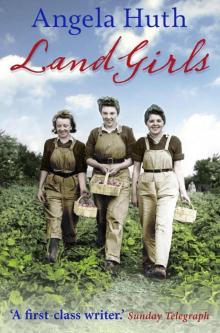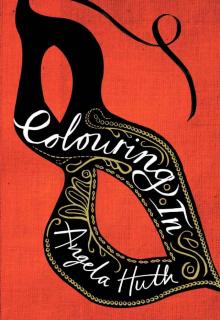- Home
- Angela Huth
Colouring In Page 19
Colouring In Read online
Page 19
Mrs. G had done her best but she’s not a natural housewife. I had to give a thorough turn out to most of the rooms, and plainly the stairs hadn’t been hoovered for a week or so. There were six or seven of Mr. G’s shirts to iron – Mrs. G says she ruins anything she tries to iron, so I took some home with me. I didn’t say anything, of course. In fact I congratulated her on how well she’d done, and she was very pleased. I went on to make a little joke. I said you don’t really need me, Mrs. Grant. You can manage on your own. She looked horrified, I have to say. It’s nice to know you’re appreciated.
I was rather dreading doing the spare-room. It had come to feel like my room, and I’d hated leaving it after my lovely week there which I shall always look back on as if it was a dream. But in a funny way, once I’d left it, it had just become the spare-room again, nothing to do with me, so I didn’t mind. It even looked different. Well, I suppose I was sat so long in the arm chair looking out of the window, the visitor. And now back in my job I was busy getting the tops done and everything. No wonder it looked different. ‘You’re a daft one, sometimes, Gwen,’ I told myself.
There’s a date set now for the identity parade. I had ever such a nice letter from the police. I’m a bit nervous, of course – I’ve never had occasion to be in a police station – but they assured me it would all be over very quickly and there was nothing to worry about. Mrs. G said the same: nothing to worry about. She was pleased they were going to some trouble to try to track down the man who mugged me, and all the others. So was I. I was pleased to be able to help their efforts.
What I did think was, it was time to buy a new coat. I hadn’t had a single piece of new clothing for as long as I could remember, and this was just the occasion. I wanted to look smart for our Metropolitan Police. I wanted to look like a responsible person who could rise above adversity, and my old coat wouldn’t be much use at that. So I decided that I’d spend a nice quiet hour or so in Marks: treat myself to a new bag – the one the man got away with was on its last legs and there were only a few pounds in the purse – and a coat or jacket that would suit all weathers. I’d not shopped for clothes for ages. I set off quite excited.
BERT
In the week that followed my meeting with Rosie, a great deal happened very quickly. I didn’t change my mind about buying her house. I remained convinced it was the best idea I’d had for years – one of those fallen from the sky, coincidence things. Or fate, perhaps: my arriving over the garden wall just as potential buyers, not wanting the house, were leaving. Such happenings, I like to believe, are kindly arranged by the Gods.
Rosie and I got down to things the day after we met. I agreed to pay the price that the agent had suggested. And it was amazing to find how quickly the negotiations for buying a house can be accomplished if two decent lawyers work keenly towards the same purpose. By the end of the week the contract was signed, the deposit paid. I spurned the idea of a surveyor: I was aware a lot of structural work needed doing, and had no interest in knowing exactly how much it would cost me before the place was mine. My London house, which I would sell as soon as possible, would be worth at least three times what I was to pay Rosie.
I spent part of every day with her, and bought three more of her paintings. She was pleased to think they would stay on the walls.
We went through the house very carefully, room by room. She pointed out the copious work that would have to be done. The garden that I would inherit, though, was perfection. I’d always fancied myself as something of a gardener. I’d have the time, now, and would enjoy learning.
Rosie supplied me with constant carrot cake: I took her bottles of claret, which she loved. One night I drove her to the hotel for dinner. She had dressed herself up in an old velvet dress, and several scarves that shimmered and glittered, gipsy-like. She looked marvellous. Must have been quite something when she was young, I thought again. What a dinner, what a companion! We had already discovered she had known several of my parents’ Norfolk friends, but she was always vague about her own past and I did not press her. No: we talked about local poets, and the crisis of the eroding dunes, and job possibilities for my new life. She suggested several causes – mostly environmental – that would benefit from both my money and my business experience. I said I would look into all of them as soon as I returned. She then questioned me, a look of concern in her merry eyes, about how I thought I’d manage living alone on the marsh?
This was something I had not thought of much, knowing it would be fine. I’d never shunned solitude. I’d always been attracted by the idea: far better to be on your own than to be with the wrong person, I said. At this she pursed her lips, questioned my belief that I’d be happy. It was one thing to live alone when you had a great passion in life which you could pursue without interruption – painting, writing, composing, whatever – quite another if you had nothing specific to do. Then, the days could be long … and lonely. I assured her I was pretty good at regimenting my days, and once I’d offered my services to various local organisations, I’d be off to work every day, as in London or New York. The joy would be coming back to the marsh. Rosie still looked doubtful.
By the time we were drinking brandy with our coffee she had become emboldened enough to express slight curiosity about the romantic part of my life. I felt it safe – and rather agreeable – to be able to tell her that I was in love with a married woman, my best friend’s wife, which made it hard to contemplate anyone else. She smiled: said she could imagine that. For over forty years I’d been on my own, I said, and quite happy, and it might be too late to change. I’d probably become stuck in my ways and no woman would be prepared to put up with them. – Besides, where was I going to find a wife on the marsh?
Rosie laughed. By now there were two vivid patches on her cheeks that matched one of the scarves. She suggested I keep a tiny pied à terre in London, so as not to cut myself off completely, and so that I could still indulge in some cultural life. I agreed. I was no hermit, I said.
We were the last to leave the dining room. Rosie claimed she hadn’t enjoyed herself so much for ages and nor, I realised, had I. I drove her home and told her that I hoped that in the event of finding a wife, my dearest wish would be that she would become as enchanting as she, Rosie, in forty years time. When I kissed her on the cheek there was a faint scent of my mother’s powder – or was that a nostalgic illusion, such as I’d been struck with when I smelt it on Carlotta? My mother’s laugh, too, had something in common with Rosie’s – soft and cooing, a kind of burbling stream-like laugh that made you think that some people were blessed with the art of always finding things to amuse.
On the way back to London, I drove slowly, thinking of all the strange and unexpected things that had happened during the week. I kept procrastinating about contemplating the immediate future. Carlotta had rung me to say the house was ready for me: have to say she’s done well. It was going to be very hard indeed telling her I no longer wanted it. We had made a plan that I should go straight there, and she would drop by in the evening to ‘explain things,’ and hear my reaction. God, I dreaded all that.
And there was another thing: Dan had asked me round to supper the following night, plus Carlotta. So what was I to do about breaking the Norfolk news to him and Isabel? Say nothing, yet? Waffle on about how well Carlotta had done, and at some future date explain to all of them that in fact I was leaving London? Or should I, at this dinner for the four of us, make my announcement?
Perhaps that would be the best thing. Hard to decide.
I let myself through the front door mid-afternoon and found the place unrecognisable. Carlotta certainly had done a wonderful job, if a spanking new look with pale colours and muslin curtains and vivid cushions are what you fancy: it was nothing to do with me. My house no longer. Even my chair, newly upholstered and covered in taupe linen, was a stranger. Carlotta had certainly thought of everything. There were flowers and pot plants everywhere. The – new, huge – fridge was full of delicious expensive foods, and Ve
uve Cliquot champagne. She must have remembered it was my favourite. Top marks, I thought: top marks, but I didn’t like any of it. I couldn’t wait to leave.
In the two hours before Carlotta was due to arrive I did my best to make the place look a little lived-in: I hoped she would take this to be something of a compliment. I flung down the papers and put files on the desk. I hung two jackets in the hall, made a cup of tea and didn’t wash up the mug. I put on some Schubert and tried out the face-lifted chair: horrible. Thank God, I thought, there’ll only be a very short time living with all this.
Carlotta arrived promptly at six, expectation coming off her like static. She was looking good, in modest scarlet and a wonderful necklace of faux rubies. ‘Oh Lord,’ I thought, ‘I’d better jack up the invitation to dinner from the place round to the corner to somewhere a great deal grander.’
I’d opened one of the bottles, poured her a glass, explained I was overwhelmed by all she’d done. She looked a little uncertain, rather touching in her sudden lack of confidence.
‘Do you really like it?’ she asked.
‘I do,’ I said, and gave her a kiss on both cheeks.
To make her assurance double sure, I then sprayed on the adjectives: marvellous, subtle, wonderful, amazing – and all so fast and efficient. I could see her storing away every new exclamation of delight, and felt like a shit. She insisted I do a tour of every room with her: I’d already done one on my own, but of course agreed to this with a convincing show of eagerness. She gave me little histories of things – how she’d been so lucky to find the antique quilt now on my bed at a sale somewhere, and as for the Kelims…I listened, hoping I showed interest.
I thanked her for the flowers, food, drink, and above all her extreme kindness in doing all this. Then we returned to the sitting room and re-filled our glasses. She asked perfunctory questions about Norfolk, and I assured her I’d had a good time. Then she looked at her watch: my cue to suggest dinner.
‘Oh,’ she said, ‘that’s very kind but I wasn’t expecting to have dinner with you. I’m off to the Opera.’
‘Some new admirer?’ I asked.
‘You could say that,’ she answered, looking down.
I expressed my disappointment in a way that disguised the relief. It meant I could have an evening on my own: unpack, find my bearings in all this alien newness. Later, I’d ring Rosie, tell her about it. It would make her laugh.
Carlotta stayed for a little longer. I have to admit she looked awfully good in scarlet. What my mother would have called striking. We had a short business discussion about the bill – rather sweetly, she assured me she was in no hurry for the balance that I owed her. Then she put down her glass, came towards me and put her arms round my neck. She said she’d loved doing the house for me: it had been a good diversion in a rather low time. I kissed her forehead, then she stepped back from me, and I saw a moment of sadness cross her pretty eyes. But quickly she was all gaiety again: admitted she had been dreading my reaction to the house, but was over the moon I’d liked it. She hurried out with a wave, saying she was going to be late, but we’d meet again tomorrow night with Dan and Isabel.
Had I done all right? I wondered. I didn’t know.
Much later, having enjoyed choosing things for dinner from the fridge, I returned to my chair and finished off the champagne. I felt a little drunk, a little muddled. Carlotta in her scarlet, and I don’t even like red.
In an odd way I rather wished I’d been the man taking her to the opera.
Chapter Eleven
ISABEL
Gwen seemed to be both excited and nervous about the identity parade this afternoon. She told me she had bought a very smart new green coat, her first for fifteen years, and did I think she should wear a hat? I said I thought that wouldn’t be necessary. But she’s of the belief that a hat is synonymous with being dressed up. She said she was determined to show both the police and the men she was going to inspect that she was a woman undaunted by an attack. When she left, her mind was still not made up about the hat. I noticed that several times this morning, when she was in the kitchen, she glanced out of the window, almost as if she was expecting to see someone threatening out there. She would never admit to being badly shaken, but I imagine it will be a long time before she feels safe walking about the streets of Shepherd’s Bush.
I was in such a dither this morning that, very unlike me, I abandoned the whole idea of work. All because of dinner tonight: Bert coming from Norfolk. And Carlotta.
It will be the first time we’ve all been together since Bert arrived back from New York – not all that long, but it seems ages. It will assuage my guilt a little about Carlotta – being so unfriendly last time she was here. I have a faint feeling that she rather warms towards Bert, for all her protestations, and she’s not going to get anywhere with him. He’ll be delighted she’s relieved him of employing strangers to do his house, but he’s not going to ask Carlotta to share it. He may not even be in touch with her very frequently. I would guess he wants to start an entirely new life, meet new people, only keep on with his really old friends, like Dan and me. There’s absolutely no point in his encouraging him towards Carlotta because he plainly isn’t interested.
Gilbert…Bert. I suppose I’ve come to think of him as Bert by now, like everybody else. I’ve missed him. It was lovely having him here. That sort of ebullience he brings into a room, his laughter, his looks of such kindness and interest, so different from the sort of professional enquiry Carlotta sometimes goes in for. I do wish he’d get a job. Something he’d love doing. He doesn’t need to earn much money, having made a fortune in America. If he roves about, aimless, I know he’ll be unhappy. He should direct his energy into some beneficial pursuit. But what? I must try to think, help him find some work idea that will inspire him.
Bert…
Sometimes there’s a small corner of my mind that goes back to that moment – that single moment, not more than a second or two – of confusion in the cellar. What was it? I try to work it out. Nothing more than a small quickening, really. A recognition. A glimpse of a possibility that could never come about, but in a funny way you’re grateful it’s acknowledged. Just to show – vain thought – that you’re still appealing. And then there was that moment on the stairs – what was that? Nothing? Or further acknowledgement? And was it mutual, or my imagination? How can you tell, how can you ever know when you can’t discuss it. Don’t want to discuss it? Words from that old song … It’s the wrong time, it’s the wrong place… In another life, perhaps Bert and I would have found – but no, what am I saying? Dan is the love of my life.
I’ll never know the truth of the cellar moment or the stair moment, and perhaps that doesn’t matter and the questions will fade away. What is left, though, is another question: does the recognition of a possibility, outside the marriage one loves, threaten or change the firm base of that marriage? I mean, why do I feel a small frisson of restlessness this morning just because Bert is coming to dinner? Why this inadmissible thread of excitement?
It spurs me to try very hard with dinner. I bought new candles yesterday, and an extravagant amount of flowers from the Portobello Road. I spent an hour going through cookery books, and in the end chose all Dan’s favourite things.
And the really good thing is that Dan seems happy again. Whatever caused his gloom, and I imagine it was some new problem with the play, has gone. He’s in extraordinarily good spirits. He woke me up at five this morning to tell me – not in so many words – that he was full of hope and optimism again. The block seemed to have passed. I long for Rejection not to be added to his rejections. May he succeed this time. That’s one of the things I pray for.
SYLVIE
Goodness knows what happened but everything seems to be cool again. The rentals back to normal. They were acting so oddly. Mama a thousand miles away – friendly as always, but her mind just not there all the time Gwen was here. She was in such a dither, faffing about the ironing and the hoovering and how much
she had to do and how was she going to complete her mask order if she never had a moment – boring. As for Papa, he just looked miserable. The fact was, though, I couldn’t bring myself to ask him what was the matter. I absolutely didn’t want to hear about his play, or any of his plays, ever. I think people should keep their feelings about their work to themselves. I don’t drone on about my geography prep or whatever. When I’m grown up and a famous barrister or chairman of something I’m not going to bore my husband about my briefs (ha ha).
Elli told me a mega secret today. She said her mother had sent her upstairs to the study for supper extra early, saying ‘someone’ was coming round and they had to talk about business. But Elli went down an hour or so later and found a really fit looking man opening a bottle of champagne – years younger than her mother, who was in a floaty dress very low in front that Elli had never seen before. Elli said her mother tried to be nice, and introduced her to ‘Charlie’. It was quite clear they didn’t want her hanging around and underneath her mother’s smiles it was obvious she was furious with Elli for interrupting. So Elli went back upstairs feeling sick with suspicion. Poor thing. My parents’ odd ups and downs are nothing compared to what she has to go through. So I know I’m lucky.
When I got back from school Mama was in one of her cooking flurries. She gave me smoked salmon sandwiches for tea made from leftovers from their first course. I took them up to my room to eat while I was writing about the Wars of the Roses. I wanted to try very hard with this essay and didn’t want interruptions like being asked if I’d mind laying the table.
Mama was in such a spin. Better to leave her to it, I thought.

 Sun Child
Sun Child South of the Lights
South of the Lights Virginia Fly is Drowning
Virginia Fly is Drowning Of Love and Slaughter
Of Love and Slaughter Such Visitors
Such Visitors Once a Land Girl
Once a Land Girl Land Girls
Land Girls Colouring In
Colouring In Nowhere Girl
Nowhere Girl Monday Lunch in Fairyland and Other Stories
Monday Lunch in Fairyland and Other Stories Another Kind of Cinderella and Other Stories
Another Kind of Cinderella and Other Stories Invitation to the Married Life
Invitation to the Married Life Easy Silence
Easy Silence